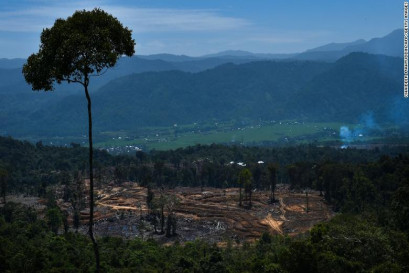
Story by Reuters
Updated 11:35 PM EDT, Thu November 04, 2021
Indonesia's environment minister has dismissed as "inappropriate and unfair" a global plan to end deforestation by 2030, days after her country, home to a third of the world's rainforests, joined 127 other nations in making the deforestation pledge.
The agreement late on Monday at the COP26 climate talks was at odds with Indonesia's development plans and the global goals should be fine-tuned, said minister Siti Nurbaya Bakar, who attended the summit in Glasgow.
"Forcing Indonesia to (reach) zero deforestation in 2030 is clearly inappropriate and unfair," she said on Twitter on Wednesday.
carbon emissions or in the name of deforestation," she said, referring to Indonesian leader, Joko Widodo by his nickname.
Her comments so soon after the pledge underline the challenges ahead over global deforestation goals, with just three countries - Indonesia, Brazil and the Democratic Republic of Congo - collectively accounting for 85% of the world's forests.
Adding to confusion over Indonesia's position, the country's vice foreign minister, Mahendra Siregar, on Thursday denied that zero deforestation by 2030 was even part of the COP26 pledge.
"The declaration issued does not refer at all to the 'end deforestation by 2030'," he said in a statement.
"It is important to move beyond mere narrative, rhetoric, arbitrary targets and sound bites," he added.
He further explained that the pledge did not mean to halt deforestation completely, but to ensure there was no net loss of forested land.
A spokesman for the environment ministry did not immediately respond to requests for clarification on Thursday and the presidential palace could not be reached.
Mahendra later told Reuters that Indonesia interprets "halt and reverse forest loss and land degradation by 2030", as stated in the pledge, as "sustainable forest management... not end deforestation by 2030".
'Profoundly disappointing'
Environment minister Siti said definitions of deforestation differed widely, so imposing European standards on Indonesia was unfair.
Instead, she highlighted Indonesia's own, less absolute goals, where the forestry sector would absorb more greenhouse gases than it releases by 2030 by minimizing deforestation and rehabilitating forests.
But the almost immediate about-face by a country central to saving the world's tropical rainforests triggered outrage on social media in Indonesia and among environmental activists.
Source: CNN